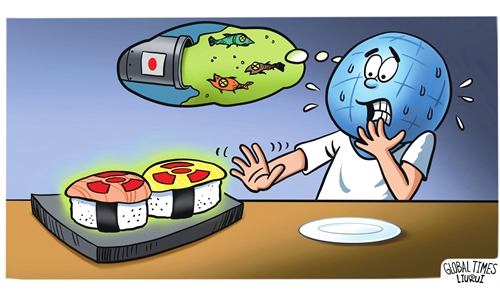Civil society cooperation between China, S.Korea needed to address Japan’s nuke wastewater dumping

Japan's dangerous move. Illustration: Liu Rui/GT
Editor's Note:
Japan on Monday ended the second round of the Fukushima nuclear-contaminated wastewater dumping. Despite widespread opposition both domestically and internationally, Japan has insisted on sticking to its dumping plan. Lee Heonseok (Heonseok), a policy advisor from the South Korea-based NGO Energy Justice Actions, shared his insights with Global Times (GT) reporter Wang Wenwen about how the dumping will affect South Korea and how China and South Korea can join hands to cope with this issue. This is the fourth installment of the series.
GT: Now that Japan has finished the second phase of dumping the nuclear-contaminated wastewater. What is your biggest concern?
Lee: The Japanese government announced that it would continue discharging water in this manner for the next 30 years. The problem of dumping nuclear-contaminated water does not end once the discharge begins. A method is needed to prevent the continued discharge of contaminated water in the future. In the short term, we must not stop criticizing the Japanese government and monitoring contaminated water. In the mid to long term, efforts are needed to change international law, including revising the London Protocol.
GT: Would you equate Japan's moves to a kind of "nuclear terrorism"?
Lee: In 1993, when the former Soviet Union's white paper on ocean dumping of nuclear waste was published, the Japanese government strongly criticized Russia and called for a ban on dumping nuclear waste into the ocean. As a result, the London Protocol was revised, and ocean dumping of nuclear waste was banned. Now, 30 years later, the Japanese government is dumping nuclear waste into the sea. Dumping contaminated water which contains various nuclides into the sea is a criminal act. In addition, pushing ahead with such an act despite opposition from neighboring countries threatens the safety of future generations, the ecosystem and neighboring countries.
GT: Since President Yoon Suk-yeol took office, South Korea seems to have taken a compromising attitude despite constant public protests against Japan's dumping moves. Yoon even ate a seafood lunch amid concerns. What do you think of the government's attitude? How will the dumping affect South Korea?
Lee: Since his days as a candidate, President Yoon has made "building a nuclear powerhouse" a significant election pledge. To him, the nuclear industry is very important. To expand the nuclear industry, he does not mention the dark side of the nuclear industry, such as contaminated water or nuclear waste issues. South Korea is the country closest to Japan. It is also a country that consumes a lot of seafood. Importing marine products near Fukushima is prohibited, but other marine products from Japan are imported. Processed seafood products from Japan are imported without any restrictions. The contaminated water that has begun to be discharged this time will pollute the marine ecosystem near Fukushima. This will eventually significantly impact marine products in nearby areas through bioaccumulation. This kind of pollution will ultimately threaten the health of the people of South Korea. Recently, salt prices in South Korea skyrocketed due to people hoarding salt due to concerns about the discharge of contaminated water. After the discharge of contaminated water, consumption of Korean seafood also decreased, so it is expected that there will be considerable damage to the domestic fishing and fishing industries.
GT: Have politicians given enough importance to the people? How will it affect the Yoon government's approval rating?
Lee: In South Korea, people's interest in Fukushima contaminated water is very high. Korean people eat a lot of seafood and are very interested in their health. Therefore, many people are dissatisfied with the Yoon government's lukewarm response to the Fukushima contaminated water issue. In a recent public opinion poll conducted by Gallup Korea, 60 percent of people responded that President Yoon is "not performing his duties well." And the biggest reason for this evaluation was the Fukushima contaminated water issue (15 percent). The longer the contaminated water problem persists, the more adversely it will affect President Yoon's approval rating.
GT: How can China and South Korea cooperate on this?
Lee: Korean civil society carried out various solidarity movements with Japanese civil society to solve the contaminated water problem. The contaminated water issue was one of the main agendas at the 2023 No Nukes Asia Forum held recently by activists from eight Asian countries and regions. At the 923 Climate Justice March held on September 23, Daisuke Sato, Secretary General of the No Nukes Asia Forum, accused Japan of becoming "a perpetrator of radiation" by dumping nuclear-contaminated wastewater.
However, there has yet to be an opportunity for Korean and Chinese civil society to address the contaminated water issue together. There is a need to address the contaminated water issue through various channels, including civil society and academia, along with criticism at the government level. In the future, I hope to address the contaminated water issue together with Chinese civil society.

